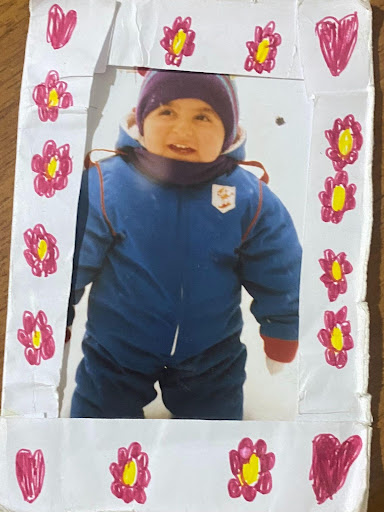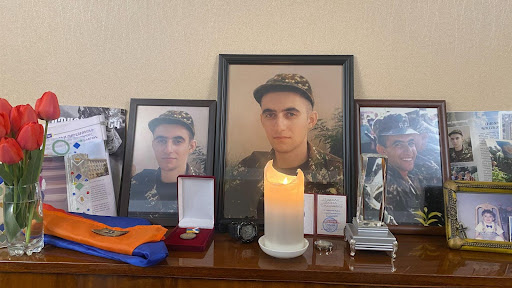When Avetis was in the first grade, on April 7, the day of motherhood and beauty, he asked his mother Anzhela Zakaryan what she wanted as a gift. Zakaryan told her son she didn’t want anything and that he was her greatest gift. So Avetis found an old photo of himself, decorated the border with flowers and hearts and gave it to his mother. This is one of Zakaryan’s fondest and happiest memories of her son.

Avetis was one of thousands of boys who died in the 44-day war in 2020. He was only 19 years old.
April 7, the Annunciation Day of the Holy Virgin, is a day of motherhood and beauty. Zakaryan experienced that motherly joy with Avetis, or Avo, as his family and friends called him. Every year, on March 8 and April 7 (both days dedicated to the celebration of women and mothers), Avetis would give flowers to his grandmother and mother and teddy bears to his sisters.
Avetis was the first child of Zakaryan and her husband Ara Booloozian, who repatriated to Artsakh from Iran.

Avetis studied at Mkhitar Heratsi Yerevan State Medical University and was training to become a military doctor. In 2019, his studies were interrupted when he was drafted into the Artsakh Defense Army. During his military service, he showed great aptitude as a marksman and was offered to become a sniper. “But we brought up our son not to kill, but to heal,” said Zakaryan. “He should have saved lives and not killed people.”
So Avetis continued his military service as a medic instead of a sniper. During his service, even when he was ill, he refused to go to the hospital, saying that the soldiers needed him, that during military service for soldiers, a medic is more important than a mother. He lost his life on the battlefield while providing aid to a soldier who was wounded by an artillery shell fragment. By the order of the Artsakh Republic, Avetis Booloozian was posthumously awarded the Military Service medal.
As a mother, Zakaryan felt her son’s anxiety, pain and joy without words. Avetis never complained. He was modest, generous and had a sharp sense of humor. He was quiet during the war and optimistic that everything was fine. “They say that he didn’t want to cause me pain, but can there be a bigger pain than this?” asks Zakaryan. Her son’s reserved nature deprived her of knowing many things about his life in recent years. What hopes and dreams did he have? Did he have a girlfriend? Had he had his first kiss? These are questions that his mother constantly wonders to herself. She talks to her son in her thoughts.
Every corner of the house is a reminder of Avo—the belongings he collected in his bedroom, his sports kits, his favorite foods that his mother no longer dares to cook.

In memory of their beloved son, Anzhela and Ara founded the Avetis Booloozian Charitable Non-Governmental Organization. The organization has provided need-based scholarships to medical students from Artsakh. The first scholarship installment was made with funds that Avetis had saved. They plan to deposit more, as they collected sufficient funds so they can repeat this program every year.
Asked what gives her the willpower to keep living her life, Zakaryan responds, “It is hard to use the word ‘live.’ This is a kind of death. You die by just breathing, and you feel that if you take a slightly deeper breath, a knife will pierce your heart.”
Zakaryan is also raising her young daughter, who reminds her of Avo in every way – with her facial features, her character and her ideas. They even share the same favorite foods and cartoons, despite their age difference. “Anna is the reason for my life,” says Zakaryan. “In her look, movements and smile, I bring my son back to life every day.”



Be the first to comment